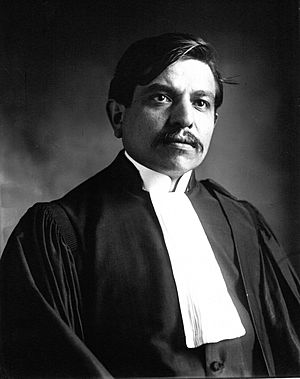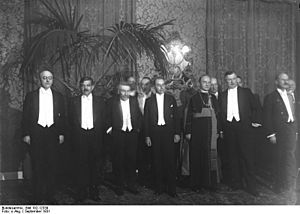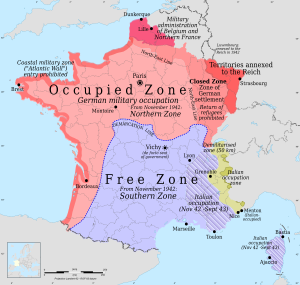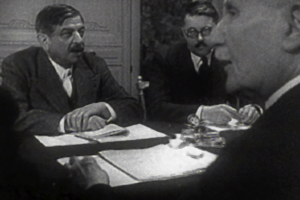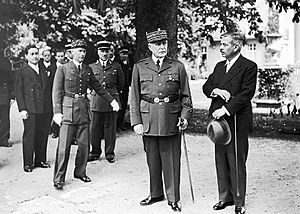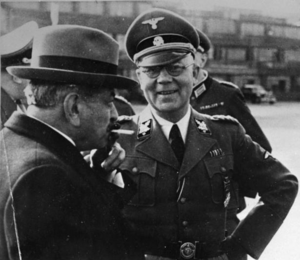Pierre Laval facts for kids
Quick facts for kids
Pierre Laval
|
|
|---|---|
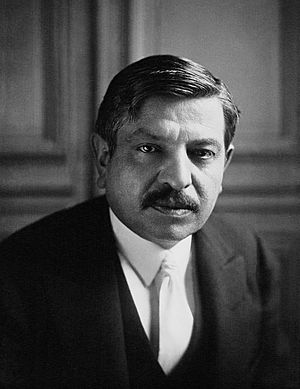
Laval in 1931
|
|
| Prime Minister of France | |
| In office 18 April 1942 – 20 August 1944 |
|
| Chief of the State | Philippe Pétain |
| Preceded by | Philippe Pétain |
| Succeeded by | Charles de Gaulle |
| In office 7 June 1935 – 24 January 1936 |
|
| President | Albert Lebrun |
| Preceded by | Fernand Bouisson |
| Succeeded by | Albert Sarraut |
| In office 11 July 1940 – 13 December 1940 |
|
| President | Philippe Pétain |
| Preceded by | Philippe Pétain |
| Succeeded by | Pierre-Étienne Flandin |
| In office 27 January 1931 – 20 February 1932 |
|
| President | Gaston Doumergue Paul Doumer |
| Preceded by | Théodore Steeg |
| Succeeded by | André Tardieu |
| Deputy Prime Minister of France | |
| In office 11 July 1940 – 13 December 1940 |
|
| Prime Minister | Philippe Pétain |
| Preceded by | Philippe Pétain |
| Succeeded by | Pierre Étienne Flandin |
| Personal details | |
| Born |
Pierre Jean Marie Laval
28 June 1883 Châteldon, France |
| Died | 15 October 1945 (aged 62) Fresnes Prison, Fresnes, France |
| Resting place | Montparnasse Cemetery |
| Political party | Socialist (1914–23) Independent (1923–45) |
| Spouse |
Jeanne Claussat
(m. 1909) |
| Relations | Joseph Claussat (father-in-law) René de Chambrun (son-in-law) |
| Children | Josée Laval |
| Signature | |
Pierre Jean Marie Laval (born 28 June 1883 – died 15 October 1945) was an important French politician. He served as Prime Minister of France several times. First, during the Third Republic, from 1931 to 1932, and again from 1935 to 1936. Later, during World War II, he was Prime Minister from 1942 to 1944, under German occupation.
Laval started his career as a socialist and a lawyer. He was known for defending workers and union members. In 1914, he became a member of the French Parliament. He believed in pacifism, meaning he was against war, even during World War I. After losing an election in 1919, he left the Socialist Party. He then became the mayor of Aubervilliers, a town near Paris.
He returned to Parliament in 1924 as an independent politician. Three years later, he was elected to the Senate. He also held several government jobs, like Minister of Justice. In 1931, he became Prime Minister for the first time.
After France was defeated by Germany in 1940, Laval played a major role in the Vichy France government led by Philippe Pétain. This government worked with the German forces. After France was freed in 1944, Laval was arrested. He was found guilty of working with the enemy and was executed in October 1945.
Contents
Early Life and Education
Pierre Jean Marie Laval was born on 28 June 1883. His hometown was Châteldon, a village in central France. His father owned a café and worked as a postman. His family was quite well-off for their village. They also owned a vineyard and horses.
Laval went to school in Châteldon. When he was 15, he moved to Paris to study at a high school called lycée Saint-Louis. He finished high school in 1901. He continued his studies in other French cities like Bordeaux and Lyon. To pay for his education, he worked as a supervisor in schools.
In 1903, Laval joined a socialist group. He was interested in ideas about helping workers and improving society. He once said that his socialism was "of the heart" rather than strict rules. He cared more about people's lives and problems than political theories.
He served in the military briefly in 1903. Later, he spoke against large armies. He thought a citizens' army would be better.
Becoming a Lawyer
Laval decided to study law. In 1909, he became a lawyer. He was known as a "lawyer of the poor people." He often defended workers and union members who were in trouble with the government. His first famous case was defending a union leader accused of having explosives. Laval helped him get acquitted.
In 1909, Laval married Jeanne Claussat. Her father was also a socialist politician. Their only child, a daughter named Josée, was born in 1911. Laval was very dedicated to his family.
World War I and Politics
A Socialist in Parliament
In April 1914, before World War I began, Laval ran for election. He was a Socialist candidate for a district in Paris and its suburbs. He was elected to the Chamber of Deputies. At 31, he was the youngest member of Parliament.
Socialists and other left-wing parties hoped to avoid war. But the assassination of Archduke Franz Ferdinand in June 1914 led to the war. Laval's brother, Jean, died early in the war.
Laval remained a pacifist during the war. He believed in peace. In 1915, he supported a plan for French politicians to talk with politicians from other countries to try and end the war. This idea was not accepted.
He also spoke out about problems in France during the war. For example, he criticized the lack of coal in Paris in 1917. His words showed his strong opinions.
Seeking Peace
Laval was unhappy with how the war was being fought. He also spoke up for soldiers who protested in 1917. When a socialist meeting was planned in Stockholm, Sweden, Laval saw it as a chance for peace. He urged Parliament to send a delegation. He called Stockholm "the polar star" of peace. But his request was denied.
Many people who wanted peace were arrested during the war. Laval was not arrested, perhaps because he was a member of Parliament and careful in his actions. In November 1917, Georges Clemenceau became Prime Minister. He offered Laval a job in his government, but Laval refused.
After World War I
From Socialist to Independent
In the 1919 elections, the Socialists lost many seats. Laval lost his seat in Parliament. Their stance on peace and the fear of the Bolshevik Revolution in Russia contributed to their defeat.
In 1920, a large workers' union called the CGT went on strike. The government tried to shut down the union. Laval defended the union leaders and helped save the union.
Laval's connection with the Socialist Party ended around this time. The party was changing, with some members forming the French Communist Party. Laval did not join either side.
Mayor of Aubervilliers
In 1923, Laval became the mayor of Aubervilliers, a town north of Paris. He bought land there to be eligible for election. He ran as an independent candidate and won. He remained mayor of Aubervilliers for many years, almost until his death.
Laval was known for being clever and building good relationships with people. He avoided the political fights between socialists and communists in his town. He was the only independent politician in the area.
Back in Parliament
In the 1924 elections, Laval ran as an independent socialist. He won a seat in the National Assembly again. He helped a former Prime Minister, Joseph Caillaux, get a pardon. Caillaux had been arrested during the war. This helped Laval gain an important supporter.
Government Roles
Minister and Senator
In 1925, Laval became Minister of Public Works. He held other government jobs too, including Minister of Justice. When he became Minister of Justice, he stopped working as a lawyer to avoid conflicts of interest.
In 1927, Laval was elected as a Senator. This meant he was less involved in the daily political struggles of the lower house of Parliament. He wanted to change the French government system to make it more stable.
In 1930, Laval became Minister of Labour. He helped end a large strike by textile workers without violence. He also worked on a new law for social insurance, which provided benefits for workers. This law was very important and passed with wide support.
Personal Wealth
From 1927 to 1930, Laval started to become very wealthy. He invested a lot of money in different businesses. Some of this money came from other investors and banks.
He bought two newspapers, Le Moniteur du Puy-de-Dôme and the Lyon Républicain. The Moniteur's circulation more than doubled under his ownership. These investments brought him a lot of money. He believed that being financially independent helped politicians be more independent in their decisions.
Laval's First Time as Prime Minister
In January 1931, Pierre Laval successfully formed his first government as Prime Minister. Many people were surprised by his appointment. His government included many experienced politicians. He also brought in friends and financial experts as advisors.
In 1931, France was not yet greatly affected by the worldwide economic crisis. Laval said that France was strong because of hard work and savings. France had large gold reserves and low unemployment.
Laval used France's economic strength to help with international diplomacy. He traveled to London, Berlin, and Washington, D.C. He attended conferences about the world crisis, war debts, and disarmament.
Dealing with Financial Crises
In 1931, Austria faced a major banking crisis. This threatened to cause a global financial crisis. World leaders tried to arrange a loan for Austria. However, Laval delayed the plan. He wanted France to get certain diplomatic benefits first. This delay contributed to the bank's collapse, which then spread to other countries.
US President Herbert Hoover proposed a plan to freeze all government debt payments for one year. This was called the Hoover Moratorium. It aimed to help countries like Germany and Britain. France had less private debt in Germany but a big interest in war reparations from Germany. Laval's government needed Parliament's approval for this plan. There was a delay in getting this approval, which some blamed for the plan's limited success.
Laval traveled a lot to discuss these issues. He met with leaders in London, Berlin, and Washington. He tried to get a security agreement for France, but he didn't succeed. However, his travels made him more well-known. Time magazine even named him "Man of the Year" in 1931. He was the first Frenchman to receive this honor.
Before World War II
In 1934, Laval became Minister of Colonies. Later, he became Foreign Minister. At this time, he was against Germany. He tried to form alliances against Germany.
He met with Benito Mussolini in Italy in 1935. They signed an agreement. This agreement gave Italy some French land and allowed Italy to act freely in Abyssinia (now Ethiopia). In return, Italy would support France against Germany. Laval denied giving Mussolini a "free hand" in Abyssinia.
In April 1935, Laval convinced Italy and Britain to join France in the Stresa Front. This group was formed to oppose Germany's plans in Austria. He also signed a treaty with the Soviet Union in May 1935.
In June 1935, Laval became Prime Minister again. In October 1935, he and the British Foreign Minister proposed a solution to the Abyssinia Crisis. This plan was seen by many as giving in to Mussolini. It was leaked to the media and caused a scandal. Laval was forced to resign in January 1936. After this, he was out of government for a while.
Role in Vichy France
Forming the Government
In June 1940, German forces were quickly advancing into France. Marshal Philippe Pétain wanted to ask for an armistice (a ceasefire). Laval was in his hometown. He traveled to Bordeaux, where the government had moved.
Pétain was asked to form a new government. Laval wanted to be Minister of Foreign Affairs. He believed this role would help him work with Nazi Germany, which he saw as the winner of the war. Laval was not part of the government that first asked for the armistice. His name became more prominent when he criticized the government's idea of leaving France for North Africa.
The armistice terms were harsh, but France kept its colonies and navy. The French government was allowed to rule parts of France if it followed German orders. The idea of "collaboration" (working with the Germans) was part of the agreement.
In the Vichy Government (1940–1941)
Laval believed Germany would win the war. He thought France should try to be like Germany and its totalitarian system. When he joined Pétain's government, he worked to dismantle France's democracy.
Laval was in constant contact with German authorities. He tried to get the best deal for France, but this made many French people see him as "the Germans' man." Meetings between French and German leaders, like Pétain and Adolf Hitler, showed this collaboration. However, these meetings often disappointed both sides. Hitler wanted France to declare war on Britain, but France wanted better relations with Germany.
Laval made some decisions on his own that favored Germany. For example, he turned over copper mines and Belgian gold reserves to German control. He later said he couldn't stop the Germans from taking what they wanted.
These actions led to his dismissal on 13 December 1940. Pétain felt Laval's working style was messy and that Laval showed a lack of respect. Laval was arrested and sent to his home. Pétain announced that Laval was removed from the government.
In August 1941, Laval was shot and slightly wounded during a public event. He quickly recovered.
Return to Power (1942)
Laval returned to power in April 1942. In a radio speech, he said he wanted to have good relations with Germany and Italy. He also said he hoped for a German victory. He believed that if Germany lost, communism would spread everywhere.
Germany needed more workers for its factories. Laval's government was asked to send over 300,000 skilled workers to Germany. Laval tried to negotiate. He offered to send one worker for every French prisoner of war released by Germany. A compromise was reached: one prisoner would be released for every three workers sent to Germany.
Laval's government also cooperated with Germany in sending people to German-controlled areas. Laval tried to protect French citizens, but his government still sent many people.
Laval faced a difficult situation. He had to maintain the Vichy government's authority. This was to prevent Germany from setting up a puppet government led by French Nazis.
Leader of the Milice (1943–1945)
In 1943, Laval became the leader of a new group called the Milice. This was a collaborationist militia. However, the real leader of its operations was Joseph Darnand.
When the Allies landed in North Africa, Germany occupied the rest of France. Hitler wanted France to declare war on Britain. Laval and Pétain refused to do this. During this time, Laval struggled against other ministers who wanted even closer cooperation with Germany.
During the Normandy landings in 1944, Laval made a speech. He told the French people not to join the fighting. He warned that if they did, there would be harsh consequences. He urged them to remain disciplined and think only of France.
About two months later, German forces arrested Laval and other Vichy government members. They were taken to Belfort, France, and then to Sigmaringen, Germany. In April 1945, Laval fled to Spain. But after 90 days, Charles de Gaulle pressured Spain to expel him. Laval was then flown to Austria, where American authorities arrested him. They handed him over to the French government. Laval was sent to Fresnes Prison in Paris to await trial.
Trial and Execution
Laval was accused of plotting against the security of the state and working with the enemy. He was sentenced to death.
His execution took place on 15 October 1945, at Fresnes Prison. He was shot by a firing squad. His last words were "Vive la France!" (Long live France!). His wife later said that it was not the French way to try someone without letting them speak.
Laval's body was first buried in an unmarked grave. Later, it was moved to his family's tomb in the Montparnasse Cemetery in Paris.
His daughter, Josée Laval, later wrote a letter to Winston Churchill. She suggested that the firing squad wore British uniforms.
Laval was one of only three people sentenced to death by the High Court after the war whose sentences were carried out.
Laval's Governments
Laval led several governments during his career. Here are the main ones:
Laval's First Government (1931–1932)
- Pierre Laval – Prime Minister and Minister of the Interior
- Aristide Briand – Minister of Foreign Affairs
- André Maginot – Minister of War
- Pierre Étienne Flandin – Minister of Finance
- Paul Reynaud – Minister of Colonies
Laval's Second Government (1932)
- Pierre Laval – Prime Minister and Minister of Foreign Affairs
- André Tardieu – Minister of War
- Pierre Cathala – Minister of the Interior
- Pierre-Étienne Flandin – Minister of Finance
Laval's Third Government (1935–1936)
- Pierre Laval – Prime Minister and Minister of Foreign Affairs
- Jean Fabry – Minister of War
- Joseph Paganon – Minister of the Interior
- Pierre Cathala – Minister of Agriculture
- Georges Mandel – Minister of Posts, Telegraphs, and Telephones
Laval's Government in Vichy France (1942–1944)
- Pierre Laval – Prime Minister, Minister of Foreign Affairs, Minister of the Interior, and Minister of Information
- Eugène Bridoux – Minister of War
- Pierre Cathala – Minister of Finance
- Jean Bichelonne – Minister of Industrial Production
- Joseph Barthélemy – Minister of Justice
- Abel Bonnard – Minister of National Education
Images for kids
See also
 In Spanish: Pierre Laval para niños
In Spanish: Pierre Laval para niños
 | William M. Jackson |
 | Juan E. Gilbert |
 | Neil deGrasse Tyson |


